How many glasses does a person need? The question occupies the wine lover over and over again. Anyone who visits me cannot get past the glass cabinet that stands in the entrance area. On the way into the kitchen, into the living room, upstairs into the office, to the
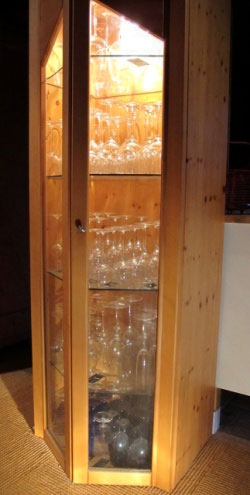 |
| Glass cupboard with more than 150 glasses |
library or to the sleeping area - the glasses cannot be overlooked. As a rule, a guest stops for a moment, nods approvingly, shakes his head, is amazed or - now and then - even enthusiastic. Almost always, a discussion develops around the question of the right glass for the wine.
Why do I also display my enthusiasm for beautiful glasses so obtrusively? Maybe it's part of my relationship with wine, or let's say it more poetically: my love for a good drop. Oops! Even in this formulation lies a piece of the secret. It is not just wine that goes into the glass, no, it is "a noble drop", "a precious juice", a "delicious drink"... In other words, the vessel from which the wine is drunk is - for me - part of the pleasure. The glass reveals so much about a wine: colour, density, shine, purity... If you hold it under your nose - not too long - fragrances escape, aromas unfold, the sense of smell is stimulated: floral, fruity, spicy, earthy, caramel... But that's not all: glasses make a sound when you knock them against each other. There is another sense involved in the drinking ritual, the tone, the sound, an almost magical noise. "The world is sound", I read somewhere, and "sound is love". Love of wine, too.
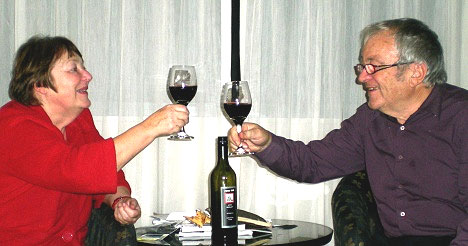 |
| Toasting is part of every wine enjoyment. In every situation% even in a hotel room in Australia. |
There is an almost grotesque situation that beautifully illustrates my love of glass. We - my wife and I - were at a campsite on the island of Rügen. A simple little tent, a camping table, a cooker - and a picnic basket with dishes and two glasses. The food was already on the table, only the wine was missing. That's when one of the two glasses broke. A glass from the department stores', at 1.90 francs each. It was Saturday evening, secluded in a meadow, far away from glasses that can be bought. That's when I made a scene, did a dance that almost broke up our relationship too. Unimaginable, simply incomprehensible. We still quote the episode today, mostly laughing, smiling, or clarifying when there are domestic disagreements again. How could this outburst of anger come about, back then? I didn't really understand it myself back then! Today I know: the very idea of having to drink wine from a cup or even a mug now - even if it was only for two days - literally threw me off the track, made any "good upbringing" shatter with one broken glass.
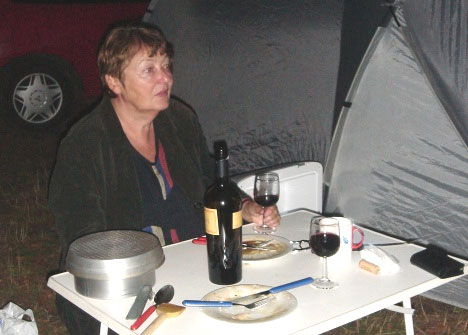 |
| Hooray% two glasses! The world is almost all right again. |
Today I know that glass and wine belong together for me. Both are necessary for enjoyment. It's not so much the rightness of the glass, that philosophy that says: a specially shaped glass belongs to every kind of wine so that all the aromas, scents and sounds can unfold. That may be true, but it can also just be a good sales argument. A look at my glass cupboard allows this assumption to be made. I am seducible not only with wine, but also with glasses. Of course - at some point it had to be Riedel, mouth-blown. And the dispute is already relaxed: Schott-Zwiesel, Spiegelau, Stölzle, Maxwell and Williams, Eisch, Littala, La Rochère... Whenever I think I've discovered the ultimate "right" glass, a wine friend turns up with an even better recommendation, gained from his own experience, of course. So that's how I arrived at my glasses, and not just in the last few years. Even when I was choosing my trousseau - in those days that was just part of it - glasses featured prominently, a multi-part set of "Sarner crystal" - simple, straight shape of the late 60s - that filled an entire cupboard. It was only much later that I got to know the pitfalls of a really good glass, its sensory dimension or the disregarded hint: "Please wash by hand!"
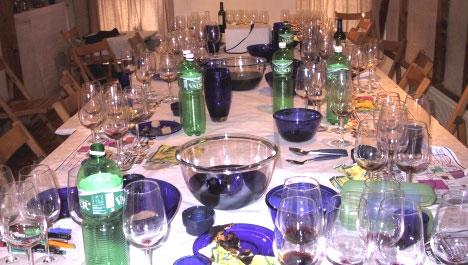 |
| Legacy of a major tasting |
Such "little things" only reveal themselves in everyday life, for example after hours of wine bliss with guests, when the table is covered with unwashed glasses, the right glass for each of the wines.
In overly serious wine discussions, another glass is brought into play, the "impitoyable", the "inconsiderate" or, to put it more charmingly, the "merciless, incorruptible". It is the maverick among wine glasses, a glass that ruthlessly reveals colour, smell, taste, acidity, body, aroma, bouquet, age and I don't know what all, and registers the slightest wine fault. No - I don't need a ruthless person, not even an incorruptible one at the table. That's why the "Impitoyable" is hardly ever used by me.
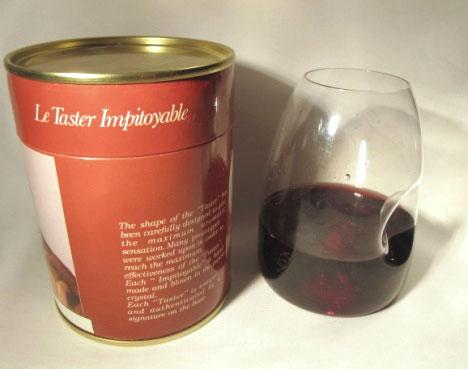 |
| L'Impitoyable - the ruthless one |
I keep it with the elegance, the beauty, the harmony.... The lightness of the glass combined with the seriousness of the wine. I like that. That's why there's always another glass vessel on the table: the decanter - or the carafe. There are really good reasons to decant a wine, but there are just as many good reasons not to. This is not the point for me. The decisive factor is presentation. Wine in the bottle belongs in the cellar, wine in the decanter on the table. I owe it that, the good wine.
That's how it happened that I not only have far more than a hundred glasses in the cupboard, but also thirty decanters or carafes on the rack. The right glass vessel for every festive table. People keep trying to convince me that this is a waste of time and effort, a fuss that can also harm the wine.
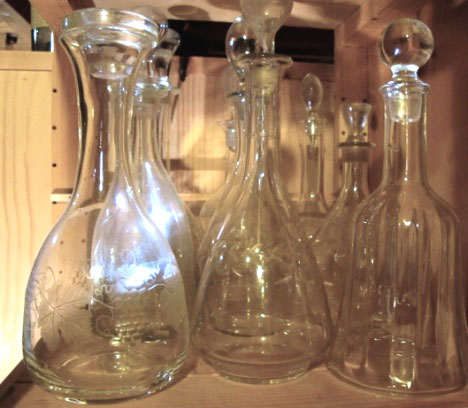 |
| Some of the decanters or carafes on the rack. |
Much more important is the temperature, the nose-friendliness of the glass, letting it rest, the sensory ability to sniff out as much as possible and feel it on the palate: gooseberries, apricots, truffles, dark chocolate, mint, melon... Actually, I don't care what I could write down. I don't want to be an inquisitor, or even an executioner, who notes down in words and numbers what he experiences and then sits in judgement over the wine. For me, drinking wine is a pleasurable affair that also includes a ritual: presenting, toasting, making glasses clink, hearing the ostracised plop, setting the table, making glasses sparkle.... The gossipy wine-drinking, which is more like a court session than a festivity, I'm sick of it. No matter how high-calibre the wines, no matter how much reverence they deserve in the case of "old wines", no matter how much they set our price-performance thinking in motion. For me, drinking is a pleasure and not a frustration, no complaining and moaning about what a wine is not capable of or promised.
For your good! You will be thrilled." This is how wine guru René Gabriel praises his own new glass, which he developed with glass specialist Siegfried Seidl (QUATRON): the Gabriel glass.This drinking ritual also includes the glass, the right glass, the beautiful glass, the elegant decanter, the magnificent carafe. This answers the initial question for me. How many glasses does a person need? The wine lover needs many, very many! The number is unimportant, the brand actually too. "Incredible wine enjoyment from a single glass! For every day! For every wine!
There is no such thing as a Züllig glass and there never will be. And yet there are many, very different Züllig glasses; they are all the glasses that stand with a good wine on a beautifully laid table, waiting to be served from a unique carafe.
Sincerely
Yours/Yours